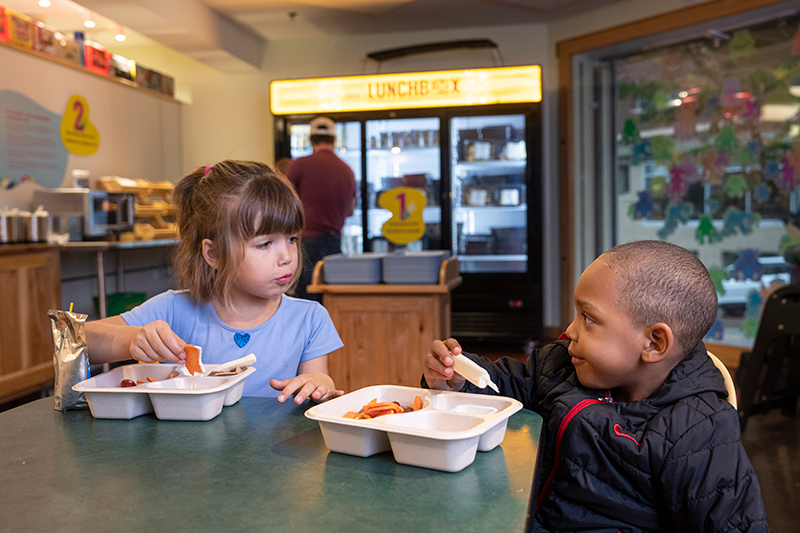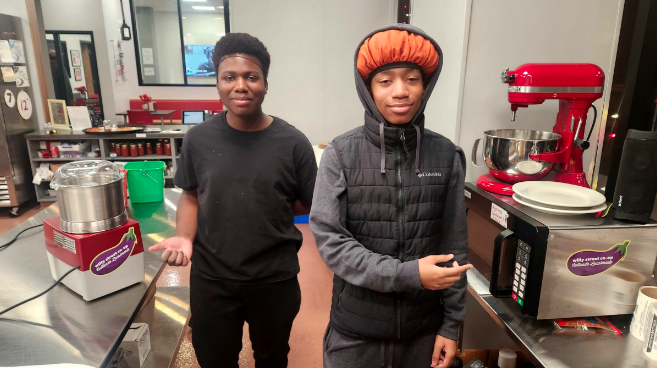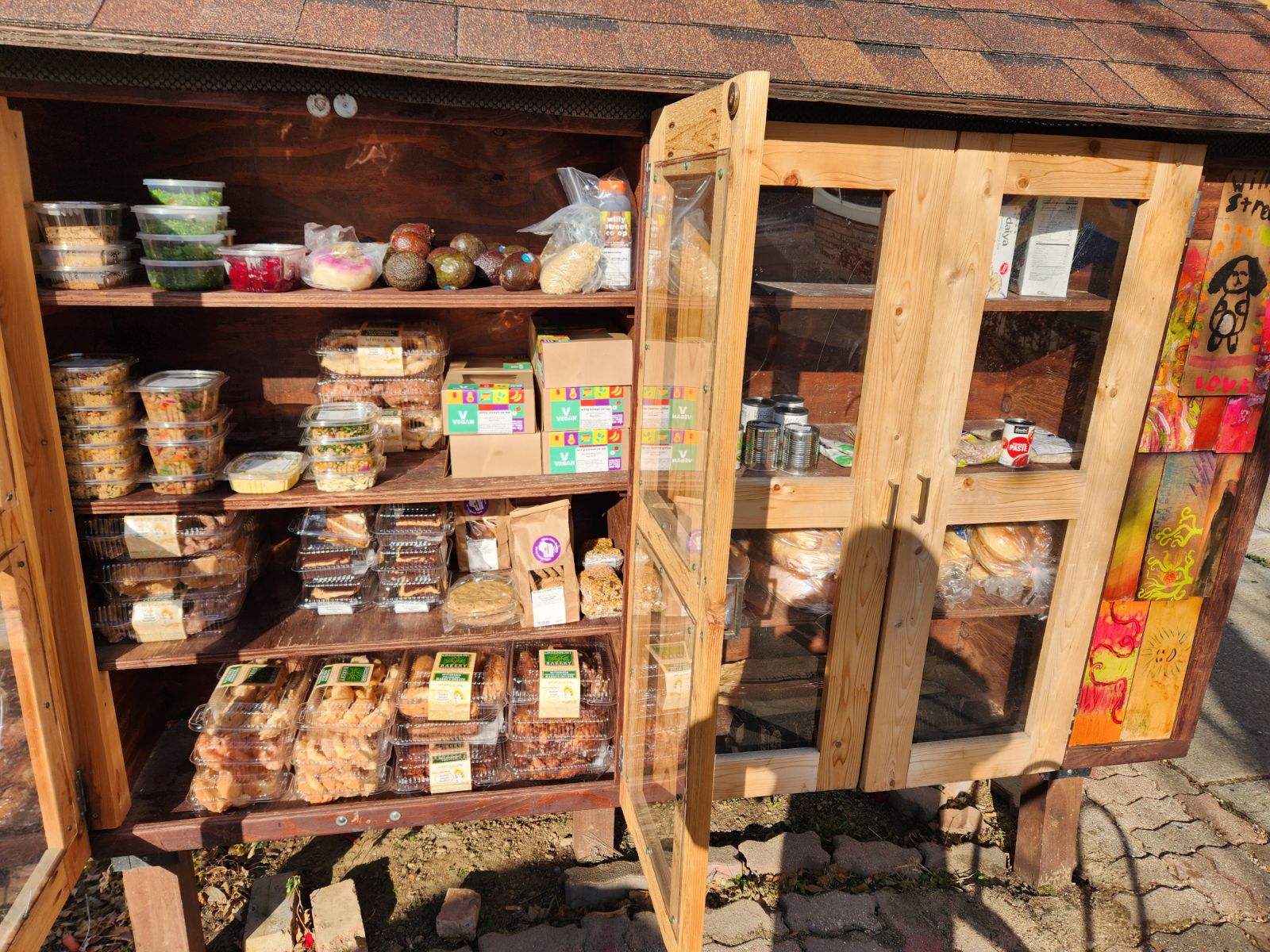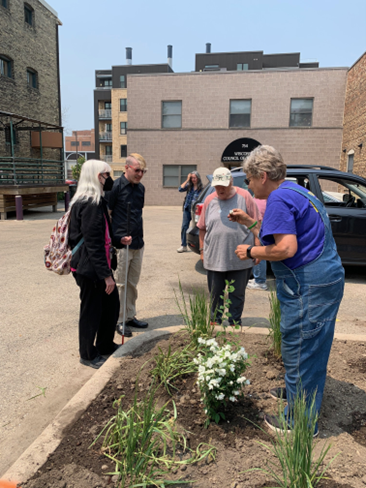by Liz Hawley, Education & Outreach Coordinator
The New Year brings the new cycle of Community Reinvestment Fund (CRF) grant applications, decisions, and awards—an exciting time of year! Applications for the CRF grant are now open, and we are accepting applications from local 501(c)3 nonprofits and cooperatives through January 31. Grants provide for local endeavors that are innovative, hands-on, and educational, impact a large group of people, reach out to underserved populations, create jobs or develop skills, foster social engagement, and offer opportunities for diversifying partnerships, collaboration, and entrepreneurialism. Grants are competitive, and this year your Co-op’s Board of Directors has allocated $65,000 from abandoned Owner equity to award. For more information and to download the application, visit www.willystreet.coop/crf.
All organizations that receive awards provide progress reports to the Co-op about their funded projects. Here are the stories we received this past year.
Bayview Foundation
With a mission “to support its culturally diverse, low-income residents in realizing their aspirations by providing affordable housing, fostering cultural pride, and building community through the arts, education, and recreation,” Bayview Foundation staff carried on a Teen Cooking Club as part of their after-school programming. The participating youth first watched a demonstration on how to complete the week’s recipe, then divided up into teams to work through the recipe by following the printed instructions. The culmination of each session was to sit down together to sample the food they prepared.
Free Bikes 4 Kidz
Free Bikes 4 Kidz (FB4K) “work[s] to see that every kid gains the health and societal benefits gained from owning a bike.” They note that many bike recipients use their bikes as their only form of transportation, and this low-cost/low-maintenance mode of transportation gets kids to school and allows family members to reach grocery stores, thus increasing food access. This year they exceeded their goal and gave away 2,014 bicycles. If you are interested in getting involved, FB4K has many opportunities, including hosting a bike donation drive in your neighborhood, volunteering at their bike donation drives or bike giveaway events, or helping to refurbish bikes during the winter months. For more information, see fb4kmadison.org.
Friends of Schumacher Farm Park
The Friends of Schumacher Farm exceeded their initial goal to build three new raised beds to increase accessibility for their volunteers, and they were able to build four new beds! They partnered with many north Madison, Waunakee, and DeForest schools and community organizations to provide gardening experiences for youth. The produce grown at the farm benefits the Waunakee Food Pantry, and the Friends group strengthened their relationship with the pantry to include free family passes to their programs to the people receiving the Schumacher Farm produce. If you’d like to get involved, keep an eye out for information about their spring work days when they need many volunteers to help set up the garden for the year. Learn more at schumacherfarmpark.org.
Just Dane
Just Bakery is a 12-week education and vocational training program providing training in baking, food sanitation, and restaurant management for individuals with significant barriers to employment. The CRF funding helped create paid training opportunities, allowing students to fully commit and get the full value of training. JustDane staff noted, “The funds JustDane received[...]were successfully used to fund the wages for two Just Bakery students during their 12-week training program. These students were able to fully focus on their lessons and complete the course. Upon completion of the program, they were able to find full-time employment and are able to provide for themselves. They are able to put the valuable skills they learned at Just Bakery to work.” If you’d like to support the Just Bakery program, you can purchase their baked goods at https://justdane.org/justbakery-4/ as all proceeds from these sales are reinvested into the program.
Luke’s Closet
Luke’s Closet, an organization with a mission to serve and support foster, kinship, and adoptive families in Dane County, reports that its spring Shop & Eat program was a huge success. The event served 53 kids, and each of them received a brand-new sweatshirt. The event also included a free meal, Madison Reading Project’s Big Red Bus, face painting, and balloons. Luke’s Closet volunteers said, “We generated a lot of smiles because of the children’s surprise at getting a new sweatshirt. A sweatshirt is something all children can use, especially in Wisconsin.” If you’d like to get involved, they are always looking for volunteers, or you can donate new or nearly new clothing for ages 0-18, or purchase clothes from their Target wishlist to help fill gaps in the closet. See their website for more information at www.stlukes-elca.org/lukes-closet.
Madison Area Food Pantry Gardens
With funding from the CRF grant, Madison Area Food Pantry Gardens (MAFPG) increased the outlets they serve by 10%. The new outlets they sent produce to are the East Madison Community Center, the Specialty Care Free Clinic, and Michele Tracy Clinic at Porchlight. They also increased the number of partner pickups (rather than deliveries by MAFPG) by 56%. They noted, “This improvement led to several outlets receiving more consistent donations of fresh, culturally relevant produce than would have been possible with [our] personnel delivering all produce.” They also invested in packaging materials to protect produce during transport to maintain the integrity of the fresh fruits and vegetables they delivered to their food pantry partners.
Madison Children’s Museum
The first year of Little John’s Lunchbox Cafe Pay-What-You-Can (PWYC) pilot has been well received by the Madison Children’s Museum (MCM) visitors and supporters, according to museum staff. Their primary objectives were to provide nutritious food for visitors, support food-insecure community members using the PWYC model, educate MCM visitors about food waste and food reclamation, and design and implement sustainable cafe systems from food procurement to waste stream. While they learned that adopting and maintaining a compost system is challenging, they provided 1,450 meals on average each month, with $6.63 paid by customers on average for each meal. (In photo above: Two young visitors enjoy a meal at Little John’s Lunchbox, the pay-what-you-can cafe at Madison Children’s Museum. Photo credit Andy Manis.)
Madison Public Art Project
The Madison Public Art Project (MPAP) commissioned the mural artist known as Audifax to create a mural under the Beltline at the Monona Drive ramp, and they report that the project was a great success! The project brought greater awareness to mental health equity, and the mural unveiling helped raise visibility in destigmatizing mental illness. MPAP is always looking for volunteers to assist with their public art projects. If you’re interested, please find more information at www.madisonpublicartproject.com/volunteer.
Madison Workers Cooperative
Madison Works Cooperative (MadWorC) is a peer network of worker cooperatives in Madison that supports the development of new worker cooperatives and the continued success of existing worker cooperatives. With funds from the CRF they built up their cooperative peer network, established mentor/mentee relationships between worker-owners of various cooperatives in Madison, and increased job mobility by helping new worker cooperatives gain an understanding of how to operate a business democratically. MadWorC facilitated a board member exchange where new cooperatives could send their board members to established cooperative board meetings to learn best practices and learn how these meetings are run.
Madison Youth Arts Center
The original vision for Madison Youth Arts Center’s (MYArts) project was to launch an opportunity for Madison-area youth to show their visual art at MYArts, with the goal of celebrating young artists and creating new opportunities for connecting with our organizations. They established an internship program for a high school student to provide insight regarding outreach to youth audiences, and in turn, the intern gained professional development experiences through collaboration with program staff, drafting correspondence to youth program professionals, and initiating outreach communication with community and school groups. Be on the lookout for upcoming youth art shows in the next few months at the MYArts facility on E. Mifflin Street.
Mentoring Positives
Mentoring Positives moved into their new commercial kitchen facility late last year, which gave them a “substantial upgrade to [their] platform for mentoring, enriching, training, and employing invulnerable youth.” CRF funding allowed them to purchase a Robot Coupe and a commercial microwave oven, allowing them to expedite the process of both chopping vegetables and defrosting ingredients, and in turn allowing the teens to put more time into helping with marketing, community outreach, product development, making and packing frozen pizzas, jars of salsa, and chocolate chip cookies, and providing good service to their customers. They have made steady progress toward growing their sales, and with more sales, the more youth they can involve in their program. If you’d like to support the work they do, you can find their “Off the Block” pizzas and salsas for sale at the Co-op or their new restaurant space at 2844 E. Washington Avenue among other retail outlets, and they can always use volunteers in the kitchen to help with prep work when the kids are in school. Find more information at mentoringpositives.org. (In photo above: Two youth working with Mentoring Positives point out two essential pieces of kitchen equipment purchased with CRF grant money.)
Neighborhood House Community Center
Neighborhood House expanded its Fresh Food Connection to meet the persistent, ever-growing need in the community for consistent access to fresh foods. This project was “created as a response to the growing need for locally sourced fresh and nutrient-dense food to be distributed in the community; and, to connect neighbors to local agricultural food systems from which they had been disproportionately excluded due to geographic location and financial limitations.” Each week through the summer growing season, Neighborhood House received 60 Community Supported Agriculture (CSA) fresh produce shares from a Crossroads Community Farm. Neighborhood House distributed this fresh produce to four affordable housing communities near the community center. Throughout the summer, they increased their food pantry users by 150%, serving 450 families in 2023.
Oiñ Productions
Summer of Love and Community Connections (SoL) set out to increase well-being, build community, and introduce communities to new arts disciplines. They achieved these goals by hosting two events—one at Warner Park and another at Penn Park. Each event featured four arts workshops where “people experienced the power of the arts to heal and support our emotional, physical, and creative development.” They plan to continue this work to connect communities with these events “to discover new cultures, types of arts, and to make artistic connections.” Follow them on social media to find out when you can enjoy their next event: www.facebook.com/summeroflovesol or www.instagram.com/summeroflovesol.
PATCH Program
The PATCH Youth Advocacy Learning Series is a 7-step curriculum that engages youth in advocacy efforts around a health topic that they are passionate about. Facilitators met with groups of high school students through the learning series, and PATCH Program staff noted that youth/adult relationships flourished during the implementation of the Youth Advocacy Learning Series. This validated how important these relationships are for the continued positive experiences and growth students had in the program. The curriculum has proven to be a success over the years, and PATCH will offer the learning series as a standalone course for schools, community partners, and individuals to implement in the future.
Rape Crisis Center
After a pilot support group launched in 2022 supporting LGBTQIA+ survivors of sexual assault, the Rape Crisis Center (RCC) found there has been a gap in services for LGBTQIA+ survivors seeking access to support groups in Dane County. To close this gap, they partnered with OutReach LGBTQ+ Community Center to facilitate virtual meetings featuring guest speakers.
Rooted
This past spring, Rooted began a new student-grown produce project to provide Madison Metropolitan School District (MMSD) students with more local food in their school meals. Seeds were started by second and third graders and then transplanted to Rooted’s Goodman Youth Farm. Youth participating in Grow Academy, a DOC transitional program for justice-involved youth, also grew lettuce for the project. In total, 350 heads of lettuce were harvested and served as side salads with school lunch across MMSD schools. The supplies purchased with CRF funds (seeds, seed trays, potting soil, and fencing materials) set this pilot program up with the infrastructure needed to continue the program in partnership with MMSD. They are currently expanding this program to provide more student-grown vegetables for school lunches.
Sherman Avenue United Methodist Church
Sherman Avenue United Methodist Church is in an area identified in the City of Madison’s Food Access Improvement Map, and the folks at the church said, “We know that we can’t get there as a community when some of us are houseless and lack adequate quality food[...]There is a shortage of places where our community members can find fresh produce.” So for the past four years, they partnered with Rooted to provide fresh vegetables from Troy Farm to food-insecure families on Madison’s north side in their food pantry and prepared community meals. On average, they served 30 people each week from June through October.
Social Justice Center
The Social Justice Center’s (SJC) focus is on connecting community members in crisis with vital resources and services, and they embraced their “role as a neighborhood hub for people in need and provide a much a much-needed missing piece: a go-to place where you can reliably access key resources and essentials while working with advocates who are trained in trauma-informed practices, crisis response, and de-escalation.” With the CRF award they received, SJC has fulfilled this role. They noted that their “community partners are now holding weekly drop-in hours at SJC and collaborating care for individuals experiencing chronic crises in the neighborhood.” They also offer opportunities for their staff on the topics of de-escalation and trauma-informed training, as well as Narcan training. Additionally, they launched their community support and resource advocacy program, including resource navigation walk-in hours and training volunteers on how to navigate and make referrals to community resources. Their free phone charging station will be installed by the end of the year.
If you’d like to get involved with SJC’s efforts, they need volunteers to support their resource advocacy and food pantry efforts. They are always accepting donations to their Little Free Pantry on Few Street, and you can view their wishlists for both their food and essentials pantry at socialjusticecenter.org/wishlists. (In photo above: Social Justice Center’s outdoor food pantry filled with donated food.)
Wisconsin Council of the Blind and Visually Impaired
The Wisconsin Council of the Blind and Visually Impaired (WCBVI) installed sensory gardens to make their building more welcoming and appealing to the senses. The Rock Prairie Master Gardener Association created the gardens, and they utilized plants that have visual, tactile, and aromatic appeal, and the public is encouraged to stop and enjoy the space at 754 Williamson Street, Madison (just a few blocks west of Willy East). (In photo above: Master gardeners give Wisconsin Council of the Blind and Visually Impaired staff a tour of the gardens during the early phases of planting.)
Thank You 2023 CRF Grant Recipients
Each year we look forward to reading about the innovative projects our local nonprofits propose, and hearing about the successes when projects come to fruition is even more inspiring! For us, another grant cycle has come to a close, but the work of these nonprofits never ends. Thank you to all these organizations for the impactful work you do for the communities you serve! Thanks, also, to the Owners who have left the Co-op and opted to donate their equity to charitable purposes—this funding is possible because of your generosity—thank you! We’re looking forward to reading the innovative grant proposals for 2024!



